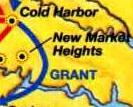
| The
2nd Pennsylvania Heavy Artillery Volunteers - Final Assignments
|
| The 2nd PA HA (provisional) remained at Cold Harbor until the evening of June 12 when Grant secretly moved all the troops out of the trenches toward the south bank of the James River to threaten the city of Petersburg and the Confederate's railroad supply lines. The Eighteenth Corps was actually a detached Corps from the Army of the James, so the 2nd PA HA (provisional) went with them. They were assigned to the Army of the James under the command of General Butler. |  |
| ©2002 Sales and People | Prior Page | Next |